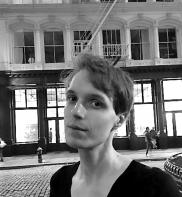 Today we are pleased to feature Jen Knox as our Authors Talk series contributor. Jen talks about her contributions to Superstition Review and what she, as a reader, looks for in a strong short story. Jen also says that the why and how she writes ultimately boils down to character and her desire to understand the human condition from different purviews. She ends her talk by offering advice to burgeoning fiction writers.
Today we are pleased to feature Jen Knox as our Authors Talk series contributor. Jen talks about her contributions to Superstition Review and what she, as a reader, looks for in a strong short story. Jen also says that the why and how she writes ultimately boils down to character and her desire to understand the human condition from different purviews. She ends her talk by offering advice to burgeoning fiction writers.
“Disengaged” by Jen Knox can be read in Issue 4 of Superstition Review, as well as “West on N Road” in Issue 14.
 Today we are excited to feature author Jo Scott-Coe as our Authors Talk series contributor.
Today we are excited to feature author Jo Scott-Coe as our Authors Talk series contributor. Today we are pleased to feature Jonathan Duckworth as our Authors Talk series contributor. In this interview by fellow writer Jaimie Eubanks, Jonathan discusses his story, “On Clear Days I Can See Your Aura.”
Today we are pleased to feature Jonathan Duckworth as our Authors Talk series contributor. In this interview by fellow writer Jaimie Eubanks, Jonathan discusses his story, “On Clear Days I Can See Your Aura.” Today we are pleased to feature poet Johannah Racz Knudson as our Authors Talk series contributor.
Today we are pleased to feature poet Johannah Racz Knudson as our Authors Talk series contributor. Today we are pleased to feature C.A. Schaefer as our Authors Talk series contributor.
Today we are pleased to feature C.A. Schaefer as our Authors Talk series contributor. Today we are pleased to feature poet Mary Morris as our Authors Talk series contributor. Mary discusses her writing process involving the current manuscript she is working on, which relates to her ninety-five year-old mother, and reads her poem, “Deduction.”
Today we are pleased to feature poet Mary Morris as our Authors Talk series contributor. Mary discusses her writing process involving the current manuscript she is working on, which relates to her ninety-five year-old mother, and reads her poem, “Deduction.” Today we are pleased to feature Kate Lechler as our Authors Talk series contributor. Kate discusses her essay, “The Breathtaking Sting of the Pull,” and what non-fiction offers to her as a writer.
Today we are pleased to feature Kate Lechler as our Authors Talk series contributor. Kate discusses her essay, “The Breathtaking Sting of the Pull,” and what non-fiction offers to her as a writer. Today we are pleased to feature poet David Moody as our Authors Talk series contributor. David discusses his poem, “Afterbirth,” and the role his mother’s career as a nurse played in his work.
Today we are pleased to feature poet David Moody as our Authors Talk series contributor. David discusses his poem, “Afterbirth,” and the role his mother’s career as a nurse played in his work. Today we are pleased to feature poet Maria Martin as our Authors Talk series contributor. Maria discusses her poetry’s subject matter and how it has evolved over time.
Today we are pleased to feature poet Maria Martin as our Authors Talk series contributor. Maria discusses her poetry’s subject matter and how it has evolved over time. Today we are pleased to feature poet Rose Knapp as our Authors Talk series contributor. Rose talks about how her poems deal with language and translation.
Today we are pleased to feature poet Rose Knapp as our Authors Talk series contributor. Rose talks about how her poems deal with language and translation.